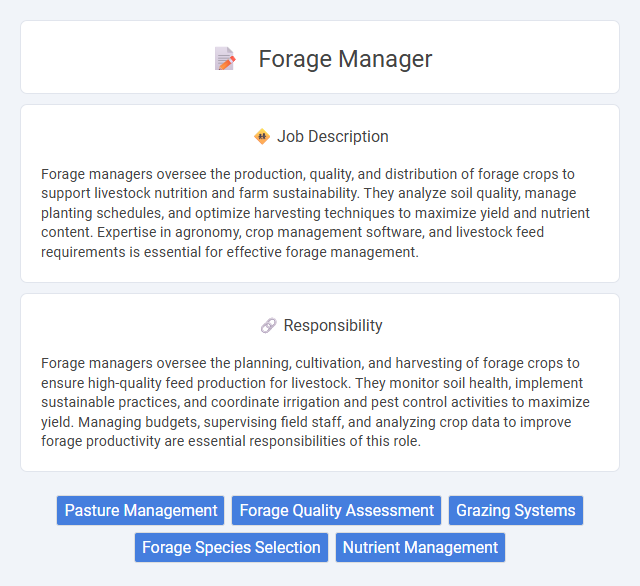
Forage managers oversee the production, quality, and distribution of forage crops to support livestock nutrition and farm sustainability. They analyze soil quality, manage planting schedules, and optimize harvesting techniques to maximize yield and nutrient content. Expertise in agronomy, crop management software, and livestock feed requirements is essential for effective forage management.
Individuals with strong analytical skills and a passion for agriculture are likely suitable for a forage manager role, which demands monitoring crop conditions and managing forage quality. Those who thrive in outdoor environments and can make data-driven decisions under variable weather conditions may find this job fitting. People less comfortable with physical labor or complex environmental assessments might face challenges in this position.
Qualification
Forage managers typically require a bachelor's degree in agronomy, animal science, or a related field to ensure expertise in forage crop production and management. Strong knowledge in soil science, plant biology, and pest control is essential for optimizing forage quality and yield. Practical experience with irrigation systems, forage harvesting equipment, and data analysis tools enhances a forage manager's ability to improve pasture productivity and sustainability.
Responsibility
Forage managers oversee the planning, cultivation, and harvesting of forage crops to ensure high-quality feed production for livestock. They monitor soil health, implement sustainable practices, and coordinate irrigation and pest control activities to maximize yield. Managing budgets, supervising field staff, and analyzing crop data to improve forage productivity are essential responsibilities of this role.
Benefit
A forage manager likely enhances farm productivity by optimizing forage growth and quality, which may lead to improved livestock nutrition and health. The role probably contributes to cost savings through efficient resource management and reduced feed wastage. Greater forage yield and sustainability could also result, supporting long-term farm profitability.
Challenge
Forage manager roles will likely involve the challenge of balancing nutrient requirements with environmental sustainability to optimize livestock feed quality. Managing unpredictable weather patterns and seasonal variations may require adaptive strategies to maintain forage availability. Coordinating with multiple stakeholders to implement efficient harvesting and storage processes could also present ongoing complexities.
Career Advancement
Forage manager roles offer significant career advancement opportunities within agricultural and livestock industries by developing expertise in pasture management, crop rotation, and sustainable grazing practices. Professionals can progress to senior agronomist or farm management positions by mastering soil health optimization, forage quality analysis, and resource allocation. Continuous learning in agro-technology and environmental regulations enhances prospects for leadership roles and strategic farm planning.
Key Terms
Pasture Management
Forage managers specialize in optimizing pasture management to enhance livestock nutrition and improve soil health. They analyze forage growth patterns, implement rotational grazing schedules, and select high-yield forage species to maximize biomass production and sustain pasture productivity. Their expertise in soil fertility, plant species diversity, and drought resistance directly influences feed quality and farm profitability.
Forage Quality Assessment
Forage managers specialize in forage quality assessment by analyzing nutrient content, moisture levels, and fiber composition to optimize livestock feed efficiency and health. Precise evaluation techniques include laboratory sampling, near-infrared spectroscopy, and on-site visual inspections to detect variations in forage quality. These assessments guide decisions on harvesting timing, storage, and supplementation, directly impacting farm profitability and animal performance.
Grazing Systems
Forage managers specialize in developing and implementing efficient grazing systems that optimize forage yield and livestock productivity. They analyze soil quality, pasture growth rates, and animal nutritional needs to design rotational or strip grazing plans that enhance pasture sustainability. Expertise in monitoring plant species composition and adjusting stocking rates helps prevent overgrazing while promoting soil health and forage regrowth.
Forage Species Selection
Forage manager expertise in forage species selection involves evaluating plant varieties for optimal yield, nutritional value, and adaptability to local soil and climate conditions. They analyze factors such as growth season, drought tolerance, and palatability to enhance livestock productivity and soil health. Selecting the right forage species directly impacts sustainable pasture management and overall farm profitability.
Nutrient Management
Forage managers specialize in optimizing nutrient management to enhance forage quality and yield, ensuring livestock receive balanced diets critical for growth and productivity. They analyze soil nutrient levels, implement precise fertilization plans, and monitor forage nutrient content through regular testing. Effective nutrient management by forage managers reduces environmental impact while promoting sustainable pasture ecosystems.
 kuljobs.com
kuljobs.com